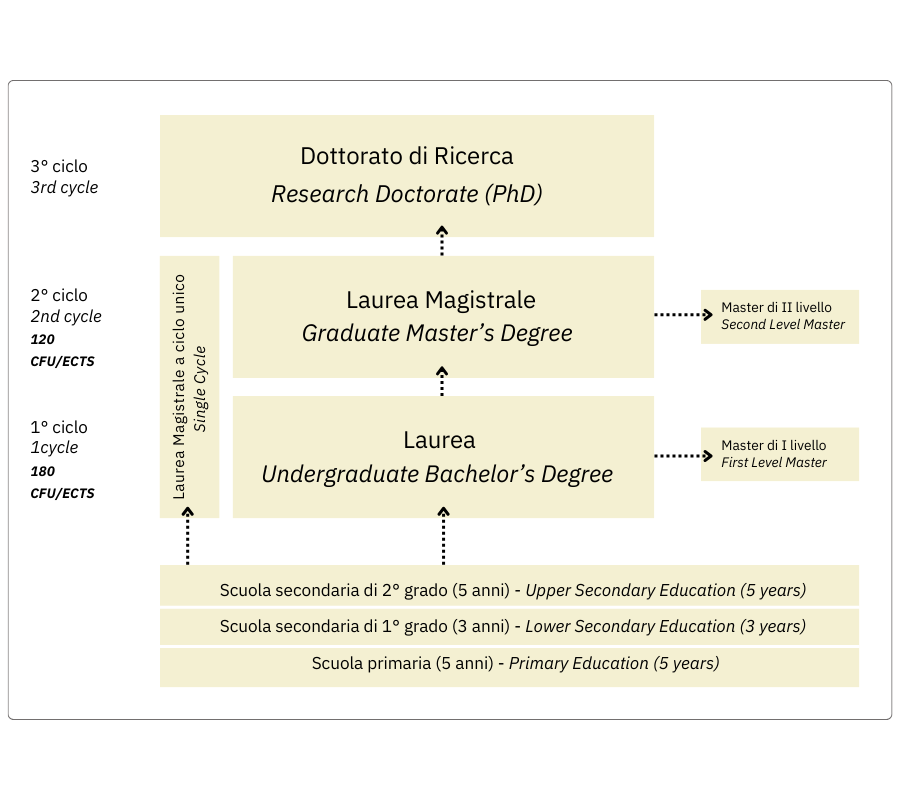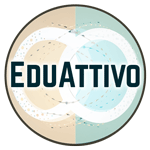Italian Higher Education System
The Italian Higher Education System is divided into levels and is overseen by the Ministry of Education, Universities, and Research (MIUR).
Each level builds on the previous one, offering increasing specialization and depth of study.
From a Foundation Year (if required) to a three-year Laurea Triennale (Bachelor’s), followed by a two-year Laurea Magistrale (Master’s).
The Master di Primo Livello is a shorter postgraduate program and the Laurea di Secondo Livello is a more specialized second-level postgraduate program.
With EduAttivo international students can carefully review the entry requirements for each level set by individual Universities.
Whether it’s language proficiency, academic qualifications, or, in some cases, professional experience, each plays an important role in securing admission.
Qualifications and entry requirements
For international students who have completed only 11 years of schooling (equivalent to some educational systems in other countries), some universities offer a Foundation Year (Anno Zero).
This Foundation Year serves as a preparatory program to bridge the gap between the student’s educational background and the requirements for entry into a Laurea Triennale program (Bachelor’s Degree).
Upon successfully completing the Foundation Year, students are then eligible to enroll in a Laurea Triennale program.
Entry requirements
Entry requirements for a foundation year vary, but they are typically designed for students who do not meet the direct entry requirements for a Bachelor’s program.
Requirements may include a High School Diploma or equivalent, and additional criteria may be set by the University offering the Foundation Year.
The Laurea Triennale (Undergraduate Bachelor’s Degree) programs are designed for students who have completed the equivalent of a Secondary Education or High School Education, which usually spans 12 years.
Entry requirements
Generally, to enter a Laurea Triennale program, you will need a High School Diploma or its equivalent.
Building upon the Laurea Triennale, the Laurea Magistrale (Graduate Master’s Degree) is a two-year Master’s Degree Program that offers deeper specialisation and research opportunities.
Entry requirements
To enter a Laurea Magistrale program, you typically need a completed Laurea Triennale or an equivalent Bachelor’s Degree from a recognised Institution.
Some programs may have additional requirements, such as a minimum GPA (Grade Point Average) or specific coursework in the relevant field.
The Master di Primo Livello (First Level Master) is a one-year Postgraduate Program providing specialised knowledge in a particular field.
It is not considered a full Master’s Degree but offers advanced training. Applicants typically need a completed Laurea Triennale or an equivalent qualification.
Entry requirements
Entry requirements for a Master di Primo Livello usually include a completed Laurea Triennale or an equivalent Bachelor’s Degree.
The specific requirements can vary between programs and some may require relevant work experience.
The Laurea di Secondo Livello (Second Level Master or Master di Secondo Livello) is a second-level master’s program, providing advanced and specialized training beyond the initial master’s degree (Laurea Magistrale).
Entry requirements
To enter a Laurea di Secondo Livello Program, you typically need a completed Laurea Magistrale or an equivalent Master’s Degree. Specific entry requirements, such as work experience or additional qualifications, may vary depending on the program.
Sistema Universitario Italiano
Italian Higher Education System

International Recognition
When it comes to international recognition of Italian qualifications, the Quadro dei Titoli Italiani dell’Istruzione Superiore (QTI) is essential.
This framework, in line with European education standards, categorizes qualifications by level, making it easier for people worldwide to grasp their significance. Essentially, it ensures that Italian academic achievements are transparent and widely acknowledged.
The QTI is a valuable tool for international students, helping them understand Italian qualifications, facilitating their recognition and mobility on a global level.
Outside of this framework you can access Short Courses and Language Programs.

